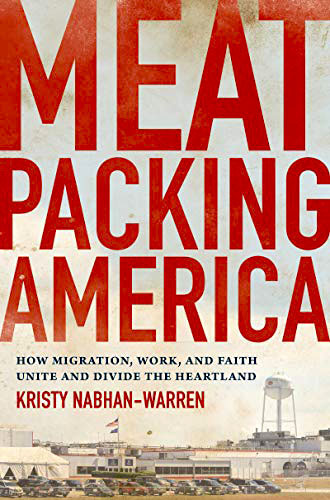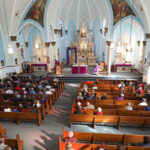By Timothy Walch
“Meatpacking America: How Migration, Work, and Faith Unite and Divide the Heartland” by Kristy Nabhan-Warren, University of North Carolina Press, 2021. To purchase the book, go to (https://tinyurl.com/mvuvur88).
Conventional wisdom warns us not to judge a book by its cover. Add to that a corollary not to judge a book by its title. That second admonition certainly applies to “Meatpacking America.”
 Don’t misunderstand. This important book does tell us about an industry vital to Iowa’s economic development. In fact, many aspects of meatpacking are woven throughout the text. But, the heart of this book is best captured in its subtitle: “How Migration, Work, and Faith Unite and Divide the Heartland.” It underscores the power and importance of cultural diversity in our state.
Don’t misunderstand. This important book does tell us about an industry vital to Iowa’s economic development. In fact, many aspects of meatpacking are woven throughout the text. But, the heart of this book is best captured in its subtitle: “How Migration, Work, and Faith Unite and Divide the Heartland.” It underscores the power and importance of cultural diversity in our state.
“The elements that drive this story of disparate native-born Iowans and newer arrivals,” writes author Kristy Nabhan-Warren, “are the conjoined passions of religious faith and desire to work hard for one’s children and grandchildren in order to achieve a slice of heaven on earth” [xi].
Sound familiar? In fact, the desire to find a haven in the Hawkeye State has been a goal of Iowans from the earliest days of settlement. Europeans who settled our farms and cities in the 19th century “sought heaven on earth” as do recent newcomers from Central America, Southeast Asia and Africa
This is a book of stories. A professor of religious studies at the University of Iowa at the time of publication, Nabhan-Warren interviewed more than 100 Iowans of many faiths and cultural origins. Not surprisingly, the majority were Catholic, but other Christians and Muslims were included in the sample as well. The interviews were friendly and transparent — a sincere effort to learn more about people who risked so much for sanctuary in the heartland.
Nabhan-Warren begins with the land — the farms so lovingly maintained by the descendants of the Irish and German Catholics. She highlights the importance of religious faith and how it extends to welcoming and working with the newest immigrants. “For both groups,” she writes, “work takes on sacred meanings” [xviii].
The narrative continues with “Homemaking” and highlights these native-born Catholic families and their farming operations. Their religious faith guides them as they embrace newer immigrant families and value their lives and labor as farm workers.
Much of the book, however, focuses on recent immigrant families and the ways they express their faith and cultural traditions in towns that include Columbus Junction and West Liberty. Guiding them along the way are priests such as Fathers Joseph Sia, Rudolph Juarez, Greg Steckel and Bernie Weir. Nabhan-Warren tells us something of each man and how they have become champions of the “politics of inclusivity.”
The efforts of these priests extended to the processing plants where their parishioners work each day. In fact, many of the plants have designated chaplains to provide spiritual guidance as requested. Some of these priests have deep ethnic roots; others have “Anglo blood and Latino hearts.” All of them minister to their flocks in homes and workplaces alike.
Chapters four, five and six take us into the processing plants and introduce us to the complex work done by these people of faith. Rich, descriptive chapters remind us of the sacrifices that are made each day to put meat on our tables.
Communication and cultural tradition are central elements in the packing plant. In addition to plant chaplains, plant managers value the translators who keep the production lines moving. Contrary to the popular notion of heartless managers, Nabhan-Warren shows that many Anglo supervisors care deeply about the welfare of their employees.
The title aside, “Meatpacking America” is a wonderful book that will be of value to anyone interested in how the American people have come to define and redefine themselves in a new land. It’s a process as old as the state itself and as new as its most recent arrivals. It reminds us that “all are welcome in this place.”
(Timothy Walch is a lay director at St. Thomas More Parish in Coralville and a member of the Board of Directors of The Catholic Messenger. He is the author of many books on American Catholicism including “Parish School,” 2016.)











